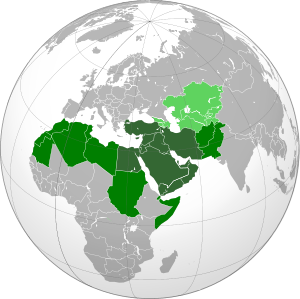Middle East On Verge Of Disaster – Analysis
By VOR
By Vladimir Fedoruk and Sergei Anisimov
Sanctions, the drone, the Strait of Hormuz have all come to symbolize the deteriorating situation in relation to Iran. Thanks to the US media, reports have been circulating that the Middle East is now in a state of war. Russian analysts are warning against ‘troubling trouble’ and pushing the world towards a new catastrophe.
The West holds Tehran responsible for the new wave of tension. Iran has been blamed for shooting down an American drone but nothing has been said about the fact that the drone was conducting reconnaissance over the territory of a sovereign state. Iran has also been accused of making preparations for a nuclear missile war and relocating its nuclear facilities to achieve this end. But there is no mention of the fact that Tehran is doing so amid reports that Israel, backed by the US, is planning a surprise strike against Iran’s nuclear facilities. Experts say that Israel could strike any time fairly soon. This could lead to a full-scale war with unpredictable consequences.
Andrei Volodin of the Oriental Research Center, comments.

“The West is stoking tensions over Iran and Syria in the Eastern Mediterranean. These moves are designed to distract public attention from the debt crisis gripping the US and Europe. The bringing down of a US drone by Iran shook the American political establishment. Under international law, the drone belongs to Iran.”
Whatever the case, the US forced Iran into a scowl and this will surely cool the hot-headed generals hoping to rein in Iran the way they failed to in Vietnam, Iraq or Afghanistan. Andrei Volodin has this to say.
“The United States and Iran are facing a moment of truth. Many US servicemen are unwilling to go into war with Iran. They know what such a war will cost. Opinions are divided within the US foreign policy establishment as well. For this reason, there is no point in saying that war is about to break out between Iran and the US, the more so since it’s already going on.”
Western analysts are rushing things by signaling war in the Middle East. They are doing so in an effort to restrain Iran. Vladimir Sotnikov of the Oriental Studies Institute, comments.
“Iran doesn’t respond to pressure. Pressurized by the US and its western allies, it is taking all sorts of painful jabs at them in retaliation. One of such jabs was an operation to block the Strait of Hormuz, which Iran deems as a strategically important waterway. This, however, is a poor reason for starting war. And the time is not the right one either. Barack Obama is unlikely to authorize a military campaign against Iran now that the US presidential race is gaining strength. Iran will be on the agenda of the next US administration.”
The attempts to stoke tensions surrounding Iran, including new US sanctions, stem from a geopolitical intrigue, analyst Stanislav Tarasov says.
“Just a few days ago, President Obama announced the withdrawal of the US contingent from Iraq. Simultaneously, the US is exerting pressure on Iran. The pullout of troops from Iraq may trigger upheavals in Iran. Western experts say that Iran could be interested in turmoil with a view to regain control of Iraq. This is why the US is taking preventive measures. It wants to play for time in order to immobilize Iran in its political and diplomatic maneuvers, reorient it to resolving its domestic problems and diabolize its nuclear program. This will endow the authorities in Baghdad with more confidence so that they could assume control over the country without assistance from the US.”
According to Stanislav Tarasov, there will be no military operations around Iran or in the Gulf in the near future. In all likelihood, he says, the political and diplomatic struggle will intensify, sanctions will be toughened and new statements about the blockade of the Strait of Hormuz will follow in response. Both parties involved are aware that war in the Middle East is fraught with a disaster for the US and the rest of the world.

Once the pipelines are complete bypassing the Straits of Hormuz and Assad falls we can pump crude and gas to the Med, cutting Iran out of it. Iran are not part of Nabucco and they will not be using Syria either. We will reverse the Iranian strategy back on them and close the Straits of Hormuz ourselves a blockade just as with Cuba.
With Iraq back online and Qaddafi gone the Libyan industry which was ineffective under Qaddafi can increase capacity and develop new fields. So any blockade of Iran will only slightly rise crude and gas prices. The Israeli’s have been talking about a blockade for some time but the environment has to be shaped.
At the moment operations are occurring in Somalia against terrorists, we sent Erik Prince down there we conditions are right in relation to terror in Somalia he will deal with the piracy and secure the Gulf of Aden choke point, shark food.
The regime will fall in 6 to 12 months. Regardless of a military option to target the nuclear program the final solution is the fall of the regime and that will be via a blockade.